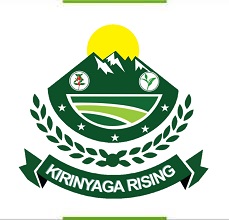Kirinyaga rice farmers upbeat as government promises to complete stalled irrigation canals
Rice farmers in Mwea rice irrigation scheme are now a happy lot after promises by the national government and county government to complete the construction of irrigation canals and feeders to enable the distribution of water from Thiba Dam to their farms. While opening the Thiba Dam last weekend, President William Ruto promised that his government will set aside Ksh. 400 million in the supplementary budget for completion of the new canals as well as removal of silt from the old irrigation canals within the scheme. At the same time, Kirinyaga Governor Anne Waiguru promised that her government will also set aside Ksh. 200 towards the same project.
During the commissioning of the dam, rice farmers had appealed for the completion of the canals which they said were an integral part of the Thiba dam project since without them, expansion of land under irrigation would remain just a dream. “Now that the dam has been completed, we are appealing to the government to facilitate speedy completion of the canals and feeders to enable us cultivate rice as anticipated in the dam project.” Said Murimi Githinji, a farmer from Ng’othi area of Mwea constituency. He noted that construction of the canals stalled three years ago.Jane Wambui, another farmer who hails from Mutithi Ward, said that farmers in the area are looking forward to getting water into their farms. She said that the prolonged dry season was a threat to food security in the area while rice farmers may incur losses as a result of dried crop. She said that their only hope is the completion of the canals to take water to their farms.
The canals are expected to serve 10,000 acres intended for expansion in Mutithi ward. The canals take water from Thiba River whose supply is now expected to be steady throughout the seasons following the commissioning of Thiba Dam. “This project is about our people, their work and their families. The aspirations of the rice growing community will only be fulfilled once the water from the dam starts flowing into their farms.” Said the governor during the dam opening. The newly constructed Thiba dam will enable the irrigation of an extra 10,000 acres of land from the current 30,060 acres under Mwea irrigation scheme. It will also enable farmers to produce rice for two seasons instead of the current one season, almost doubling production.
Data from the National Irrigation Authority (NIA) indicate that increased land under irrigation is expected to produce an extra 66,000 metric tons of rice annually, up from the current 114,000 metric tons. This will thus earn the farmers around Ksh. 14 to16 billion annually up from the current Ksh. 9 billion they earn from their produce. Kenya produces about 200,000 tons of rice annually which is half of the consumption demand. With the dam, Kirinyaga County, which produces 80 percent of all the rice produced in Kenya, is expected to narrow the supply gap. The Ksh. 7.8 billion dam project has the capacity to hold 15.5 cubic meters of water and it is the largest single project to have been implemented in the county. Adequate and steady supply of water into the rice irrigation scheme is also expected to bring to an end the conflicts that are brought about by rationing of irrigation water which has been a way of coping with water scarcity during the dry seasons.
Waiguru said that the county’s Department of Agriculture had also introduced 10,000 fingerlings of Tilapia and Catfish with an aim of improving the quality of irrigation water as well of as providing affordable source of protein for the local community. About 900 farmers from the host community will also benefit from Rukenya and Kabithe Irrigation schemes through irrigation of 900 acres of their farms.
Governor Waiguru has noted that Thiba Dam has been opened just in time for the Bottom Up actualization. She pledged to work with closely with Ruto’s government to safeguard the county’s agricultural economy especially in developing regulations for controlling rice importation in order to give the local farmers a fair and competitive chance to earn from their increased productivity. She also said that her government is collaborating with partners in order to establish a husks factory which will utilize rice husks among other agricultural produce byproducts to manufacture furniture. She said the factory will spur innovation, earn rice farmers extra pay as well as create employment.



